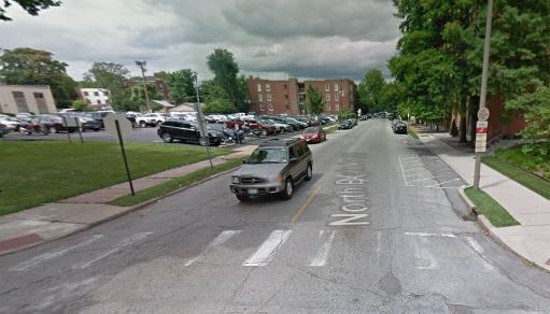
No physical evidence exists to link McKay to the August 10 robbery. However, the victim of the robbery did ID McKay, which was key to his conviction. McKay's lawyers claim the ID was "obtained under improper and suggestive circumstances" that produced a misidentification. The victim has not wavered in her identification of McKay.
Nevertheless, there is physical evidence pointing to Esters and it all goes back to that cell phone. In the days following the August 10 robbery, police were able to view the call records from the stolen phone. Seventeen of the calls were made to Esters' girlfriend. (And when those same records showed incoming calls minutes after the August 18 murder, police connected the dots to her, and then to Esters.)
After Esters' arrest for the Boken murder, the August 10 victim's phone was traced directly to him through a gas station where he'd sold it on August 19.
During McKay's trial in December, prosecutors never explained how the phone could have traveled from McKay to Esters. Prosecutors suggested that Esters had bought or stolen the phone from McKay, though they brought no evidence to support that hypothesis. McKay's conviction rested overwhelmingly on the eye-witness testimony of the victim. Depositions confirm that no evidence recovered from the stolen cell phone pointed to McKay.
"Once the victim's mobile phone was recovered, the police were in possession of probable cause and significant evidence against Keith Esters," Ramsey writes in the motion. "Had they arrested Esters, Megan Boken would still be alive. The jury would have been given powerful evidence of a motive by investigators to cover up their lethal mistake by framing another suspect."
Keith Esters' public defender, Annette Llewellyn, declined to comment for this story. Already incarcerated for Boken's murder, Esters is also awaiting further sentencing on yet another robbery in Brentwood on August 12, 2012.
The judge barred McKay's lawyer from presenting evidence that Esters was the true robber. The jury was only allowed to hear some testimony from Esters' girlfriend. However, she was not allowed to mention Esters' last name -- referring to him instead as "Keith" -- and jurors never heard about Esters' robbery spree or the Boken murder.
According to depositions, Esters even offered detectives information on the August 10 robbery, apparently in a failed attempt at a lesser sentence. He told them he was in the immediate area of the robbery and knew who did it, and that it wasn't McKay -- but McKay's jury never heard those details either.
Ramsey's motion argues that it was wrong for the court exclude this evidence. From the motion:
Defendant [McKay] was denied due process of law and this Court committed reversible error in excluding Defendant's evidence that another person, Keith Esters, had the motive and opportunity and did, in fact, commit the robbery. The evidence included testimony from Esters' girlfriend that Esters admitted obtaining the victim's mobile phone and fifty dollars ($50.00) in a robbery and that seventeen (17) calls were made from the said phone after the robbery to Esters' girlfriend.
A spokeswoman for Circuit Attorney Jennifer Joyce says many of the claims made by McKay's attorney in this motion were resolved during the trial last year.
"A jury concluded that the evidence presented at trial proved that Cornell McKay was guilty beyond a reasonable doubt of first-degree robbery and armed criminal action. We stand by the prosecution and the jury's decision," the statement reads.
But problems with McKay's trial is just one part of this story: McKay and his lawyers are also arguing that police intentionally tampered with evidence that could have helped his defense, what's known as a Brady violation.
Continue to read details of McKay's claim that detectives deleted evidence on a robbery victim's recovered cell phone.






